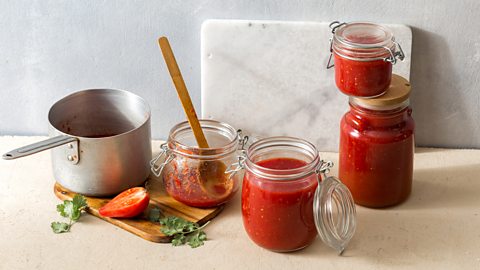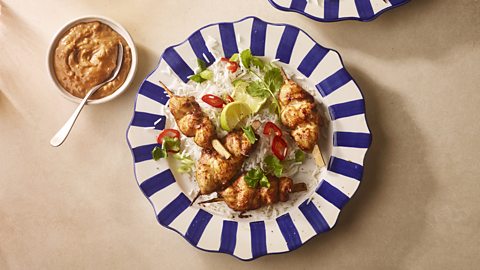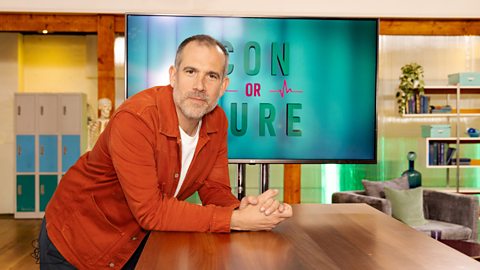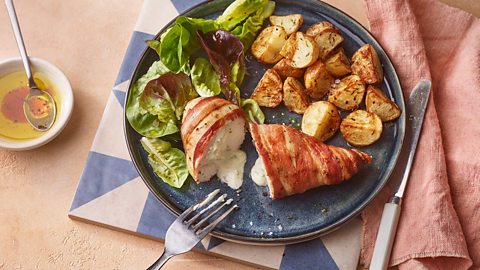Do you need to eat more protein as you get older?
Everywhere you look on social media or in the supermarket, high protein products like milkshakes and granola are being marketed. But do we really need to eat more protein? And do our protein needs change as we age?
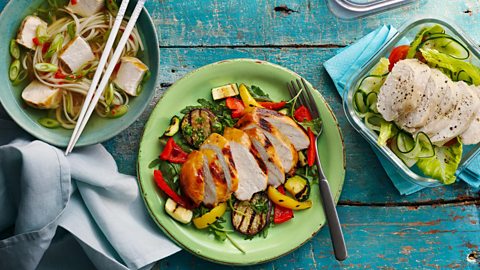
Whether you’re trying to lose weight, gain muscle or make your hair shinier, protein is often sold as the answer.
And while there’s a lot of hyperbole around protein, there’s no denying that it is essential for good health. One of the three macronutrients we need to give us energy (the other two are fat and carbohydrates), it also keeps our organs functioning, carries oxygen around our body, supports the immune system, keeps our bones strong and is instrumental in building and repairing muscle.
However, there can be confusion over how much you should eat. British Dietetics Association (BDA) spokesperson and dietitian Dr Linia Patel, gives some guidance on what to aim for.
Weight-based
“In the UK, the amount of protein frequently recommended for adults to consume each day is 0.75g per kg of a person’s weight,” explains Patel. As an example, if you weigh 60kg you’d aim for 45g of protein a day.
On average, this means men should eat 55g and women 45g of protein daily (51g if you’re pregnant). That’s about two palm-sized portions of meat, fish, tofu, nuts, or pulses.
So why this figure? It’s based on Reference Nutrient Intake (RNI) and dietary reference values data provided by the department of health. While the RNI figures weren’t created to set recommendations for individuals, the figures give estimates for the amount of nutrients 97.5% healthy people could consume to avoid being deficient in them.
Baked chicken breast
Chicken is a big source of protein and by using a little seasoning you can really up the flavour

But should we be eating more?
While it’s good practice to make sure you consume the recommended amount, Patel explains that for adults, research highlights that the figures should potentially be even higher.
“The right amount of protein for an individual depends on many factors – even the day you’ve had – for example, the activities you’ve undertaken. Other significant factors include your body composition, your current state of health, as well as your health goals.
“While adults should start by following the recommended guidance it’s likely you will need more. The reason is, that [0.75g] figure came via nitrogen balanced studies, however these are believed to have limitations. The main one being that the figures are based on making sure you prevent malnutrition rather than how to thrive.
“As a performance nutritionist, I'm always working with people to try and get them to be in ‘thrive mode’.
“There are newer methodologies to estimate protein that have come into play. One of those is called the ‘indicator amino acid oxidation method,’ which addresses some of the shortcomings of the nitrogen balanced studies.” These studies focus on how protein can improve health not just on avoiding poor health.
“These predict that the intake for adults shouldn’t be 0.75g but between 1-1.2g.
“As a dietitian, I would always be starting off at the low end. If you're responding well, then that’s fine for you. But if you’re not responding, perhaps you need to dial it up a little bit. Once again, it comes back to personalisation.”
This salmon, avocado, watercress and pumpkin seed salad is a great source of protein
Signs you’re not getting enough protein
So how do you know if you are – or aren’t – ‘responding well’ to the amount of protein you’re consuming?
Patel says it can be difficult to tell and if you want to know, you’re going to have to see a dietitian who can analyse exactly what you’re eating and how your body is responding to it. However, some signs of not eating enough protein include:
Feeling hungry even after you’ve eaten: “Including protein in a meal makes you fuller for longer and it may even help to reduce your cravings of sweet snacks later because your blood sugar levels are more regulated.”
Weakened bones: “I work with a lot of women who don’t eat enough protein and end up with bone fractures or poor bone health. You might think that calcium is the key to keeping your bones in good condition, but did you know that 50% of your bones are made of protein? So, we need to make sure we’re eating protein to preserve our bones as well.”
Dull looking skin and brittle hair and nails: “When you don’t have enough protein, your skin, hair and nails start to suffer. For example, you might notice more hair coming out or your skin doesn’t look as bright as it normally does. The reason is because you need the amino acids found in protein to keep these body parts in good condition.”
Nacho beef burritos
This Joe Wicks recipe is full of protein and feels like a treat
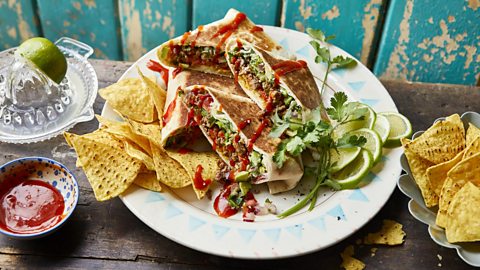
At what age should you increase your protein intake?
Below the age of 40, it’s likely you’re consuming enough protein. And, says Patel, your body is efficient at taking what it needs from the macronutrient. So, unless you have underlying conditions, you don’t need to be too focussed on your protein intake.
“The guidelines for protein when you’re young are very much around getting a balanced diet. Your body will be efficient at taking what it needs from protein, whereas actually, you need to be more aware of your protein intake as you get older because we're not assimilating and absorbing it as efficiently,” says Patel.
Also, explains Patel, it might be that eating protein seems less appealing the older we get – eating a steak for example might seem harder to digest so we might have it less.”
“However, we need to increase our protein as we age due to a process that we all go through called sarcopenia – which is the loss of muscle mass.”
Do women need to eat more protein than men?
“Sarcopenia happens to both men and women, but it’s exacerbated in women because we have a dramatic shift of oestrogen from the age of 40. Men will experience the loss of muscle from late 40s and early 50s, but it will be more of a steady process.
“Because muscle is made from protein, you have two ways of preserving it, eating enough protein and by doing weight-based resistance exercise to stimulate the muscle.
“So, women in their 40s need to be more focussed on their protein intake. Not only to maintain muscle but because you’ll experience more wear and tear.
“Also, at this age, your body shape is likely to change, weight is more likely to accumulate around the middle rather than around the hip. So, it’s even more important you get on top of your appetite control and your blood sugar regulation if you want to be on top of your body shape. Once again, protein will help you do this.”
Chickpea, spinach and egg curry
This low-calorie curry comes with lots of protein due to both the eggs and chickpeas
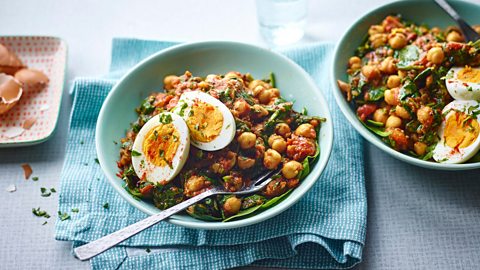
How much more protein should we eat as we age?
So how much should you increase your protein intake by as you get older? Unfortunately, there’s no clear answer but it’s about making sure you’re reaching those minimum amounts and then adding to it until you’re feeling in optimum condition, says Patel.
Evidence suggests that seeing the minimum of 1g per kg of weight a good starting point for people as they age.
However, even if you want to aim for the lower .75g per kg that might be harder than you think with studies highlighting that older people are struggling to reach the minimum amounts to begin with.
Is it possible to eat too much protein? “The guidelines state you shouldn’t go beyond 2g per kg of weight a day,” explains Patel. The reason? It could put your kidneys under too much pressure to expel the unused protein.
Following a healthy balanced diet is vital
Don’t forget the other macronutrients though, says Patel.
“Sometimes the message gets lost and everybody's just focusing on protein and then forgetting the other macronutrients, but they all work together.
“Yes, if you're wanting to get more muscle mass, you do need to eat more protein, but do you know that to optimise that protein intake you also need to make sure you're eating enough carbohydrates to get the right hormonal environment for you to lay that protein down? Often people become silo about one nutrient and forget about the others, but it must all work together.”
How to incorporate protein into your diet
There are nine essential amino acids that we need to include in our diets because our body can’t create them. These are found in meat, poultry, fish, dairy and eggs as well as soy, hemp and quinoa. You can also make sure you receive all nine on a plant-based diet by eating a variety of ingredients.
These dishes are packed with protein:
- Chicken satay noodles
- Spicy tofu and edamame beans
- All day breakfast frittata
- Tuna bean salad
- Easy Spanish chicken
Originally published June 2024
